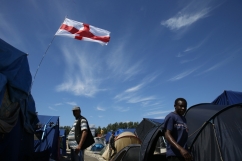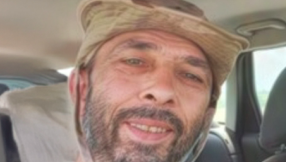The bodies of 21 women and one man were brought ashore to Sicily on Friday as fellow migrants described scenes of panic and violence when water poured into their dinghy.
Some survivors had bite marks, testimony to a desperate struggle onboard to escape death.
The stricken boat was discovered floating off the coast of Libya on Wednesday, with humanitarian group Medecins Sans Frontieres (MSF) rescuing about 104 survivors and retrieving the badly disfigured corpses.
People on the rubber dinghy said human traffickers in Libya had pushed too many migrants aboard and the floor had split after the boat put to sea, proving a death trap for young women who had been sitting in the central section.
"I kept asking for help. Nobody would help. They were climbing on me to stay out of the water. I thought I would die," a 24-year-old Nigerian woman named Mary told MSF.
"I had to bite to be able to breathe. The woman I bit stood up. Men were standing on top of me. A woman stood on my face ... A woman who was pregnant died. We were under the water together."
Erna Rijnierse, an MSF doctor who was aboard the rescue ship, the MV Aquarius, said there was an eerie silence when they neared the dinghy and it was obvious there had been a struggle.
"You can tell it from the nail scratches on people's arms and legs, but also we had 10 people with human bites on arms, a back and also on the lower back and ankles," she said.
Nearly 3,000 migrants and refugees have died in the Mediterranean Sea this year while trying to reach Europe - three quarters of them en route from north Africa to Italy, the International Organization for Migration said on Friday.
Just over 80,000 people, mainly from Africa, have reached Italy since Jan. 1, more or less in line with last year's numbers, according to official figures.
Mary told MSF she had been held in prison in Libya - immigrants are often arrested there - for two months before finding a place on the dinghy. Rijnierse said she believed many of the victims had been detained prior to the trip and were too weak to fight their way off the floor.
"They rape there. They are looking for young girls, you cannot say no, they have guns, shout, speak in their language," Mary said, describing her ordeal in the prison before she managed to escape and meet up with her husband.
Another survivor, a 30-year-old man called David from Nigeria, urged would-be migrants not to make the journey.
"Taking the boat is very dangerous. That is the truth," he said, adding: "I feel bad about the women who died. It wasn't supposed to happen."
















